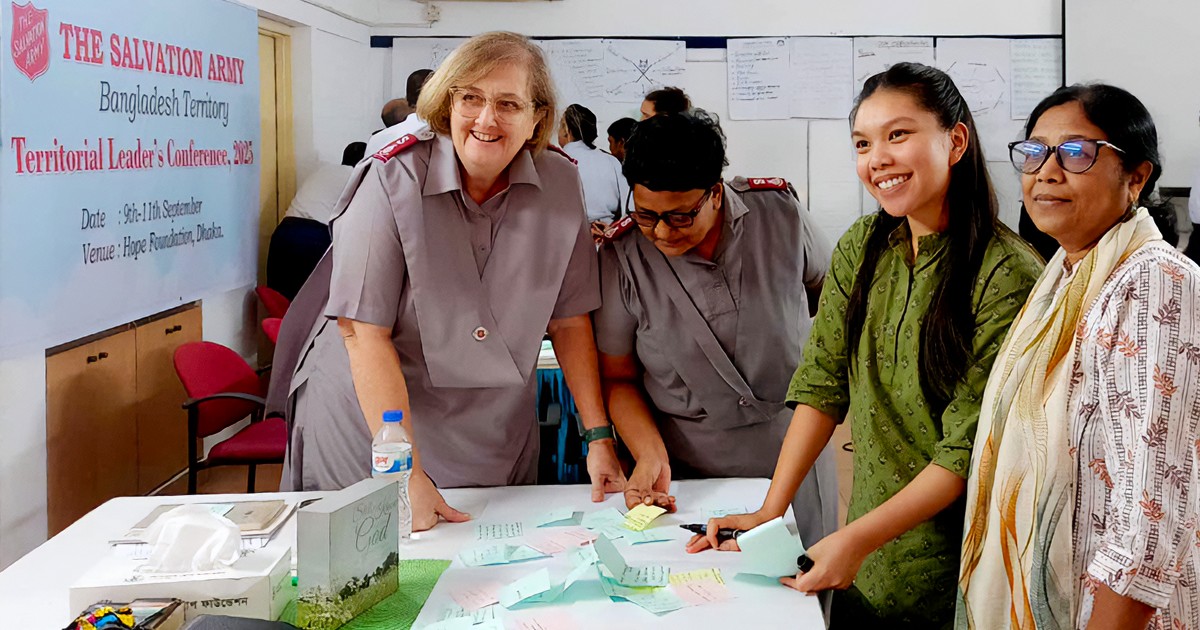The survey was conducted by The Salvation Army's Ethics Centre, which strives to ensure that the core values of the Army are evident in all areas of ministry. "Maintaining congruence between the Army's core values and operational culture is important," says Sharon Jones-Ryan, consultant, management and organizational ethics, because “what you do reflects your values, even if it's unintentional.”
“This survey gives us some really rich information about what people are thinking and it gives us a glimpse at what people want the organization to look like,” Jones-Ryan explains.
| Which
of the following values and behaviors most represent who you are? |
Which
of the following values and behaviors most represent how your organization currently operates? |
Which
of the following values and behaviors are essential for your organization to achieve its highest performance? |
|---|---|---|
| 1. Accountability | 1. Community involvement | 1. Accountability |
| 2. Compassion | 2. Accountability | 2. Compassion |
| 3. Honesty | 3. Caring | 3. Coaching / mentoring |
| 4. Caring | 4. Compassion | 4. Teamwork |
| 5. Family | 5. Mission focus | 5. Community involvement |
| 6. Commitment | 6. Brand image | 6. Adaptability |
| 7. Intimacy with God | 7. Bureaucracy | 7. Caring |
| 8. Integrity | 8. Making a difference | 8. Leadership development |
| 9. Humour / fun | 9. Hierarchy | 9. Intimacy with God |
| 10. Respect | 10. Teamwork | 10. Integrity |
Three core values appeared on all three lists: accountability, compassion and caring. Jones-Ryan notes that though people within The Salvation Army can agree on the same values, those values can look different in different contexts. “These values live differently in each of us,” she says. “Where one ministry identifies hierarchy as a positive existing value, another may see it as an impediment.”
Intimacy with God is one core value that was identified as a desired cultural value. “My personal interpretation of this would think that people want us to own our faith and unapologetically remember that we are doing what we're doing because we're called by God to do it,” says Jones-Ryan.
To understand the direction that The Salvation Army is moving in, the survey will be sent out and results will be analyzed annually. “These results are a snapshot in time. They are not prescriptive and they do not give a solution,” Jones-Ryan explains.
The hope in releasing the gathered information is that the Army will gain an awareness of where its values stand and where they hold true. “This survey gives us a place to begin conversations,” she concludes. “It's important to build with these tools and continually strengthen the connection between our behaviours and values.”









Comment
On Friday, April 3, 2020, CPT MILFRED W.A. HARPER FIRE CHAP& RTD BLACK WATCH said:
On Tuesday, August 19, 2014, Donald Jefcoat said:
On Wednesday, August 13, 2014, Sam Daniel said:
On Tuesday, August 12, 2014, Ira Barrow said:
While there must be wisdom in how the money is spent, an event like a congress, can be of immense value. I only wish General Arnold Brown were here to articulate and elaborate on that point, I, a poor substitute, will make one or two comments.
Obviously, the first is the direct spiritual value. If we believe the General is God's man for this time, it is important that we hear what he has to say. Being there when he (she) said it, makes a bigger impact that hearing it on the social media or reading it. By the way, I was not at the congress.
Some of the greatest gains I made in my spiritual life were made at various congresses, in Newfoundland, Halifax, Winnipeg,, Atlanta, and London (I was serving in England at the time). I can still recall much of what our leaders, particularly our Generals said. And when tempted, when tired, when doubtful, when perplexed, I often think back to those high-water marks in my life.
Over the years, hundreds and hundreds of good Salvationists, have either heard the call to officership at a congress, or had it confirmed. I know this to be true from my 12 years on college staff and my 14 years reporting congresses while a member of the editorial department in Canada and England.
So could it be that because we did not have faith to venture having a territorial congress for decades, lest we be condemned for wasting money that could be more wisely spent, be ONE of the reasons we've had fewer men and women becoming officers?
General Brown was quick to say that congresses "do something good" for Salvationists. Since most Salvationists serve in small corps they catch a glimpse of the bigger Army. That is a healthy thing. And many young Salvationists have found a life-long partner at a congress. I could go on but you must be tired of reading by now. Forgive me,
God bless our General!
On Sunday, August 10, 2014, Salvationist Magazine said:
You raise some important points regarding accountability and the use of finances and we appreciate your feedback; however, it is important to clarify that NO public donations are used in the funding of spiritual/church activities, internal congresses, etc. (The exception being those churches that run social services programs and this is strictly accounted for separately). ALL money raised from the public goes toward our social services efforts to help alleviate poverty. You can read more in our Annual Report at http://www.salvationarmy.ca/annualreview2012-2013/
On Sunday, August 10, 2014, Bob said:
Leave a Comment